This is the last part of 'the first decade of Zure'. Welcome back, and sorry for being late, but, you know, life :)
Please see part 1 and part 2, if you've missed them.
If the previous parts have been strongly about the past, this part is mostly about today, and, if we're lucky, about tomorrow.
The purpose
We started Zure with the simple idea of not wanting to be pissed off in the morning. In our minds, the requirements for such a company were
- Great workmates, to improve your day,
- New technologies, to let you learn,
- Focus on quality, to make you proud of what you do, and
- Autonomy (self-organization / self-determination), to let you have control over and impact your working environment.
(If interested, see references from 2011 blog posts: our mojo and recipe for success)
Otherwise, almost 9 years back, we didn't have a 'mission' statement. We did not have 'values'. It was easy being a small company; we lived and breathed what we wanted to have, and that was enough in the early days.
In our minds, the requirements for a great company have not changed during the previous decade.
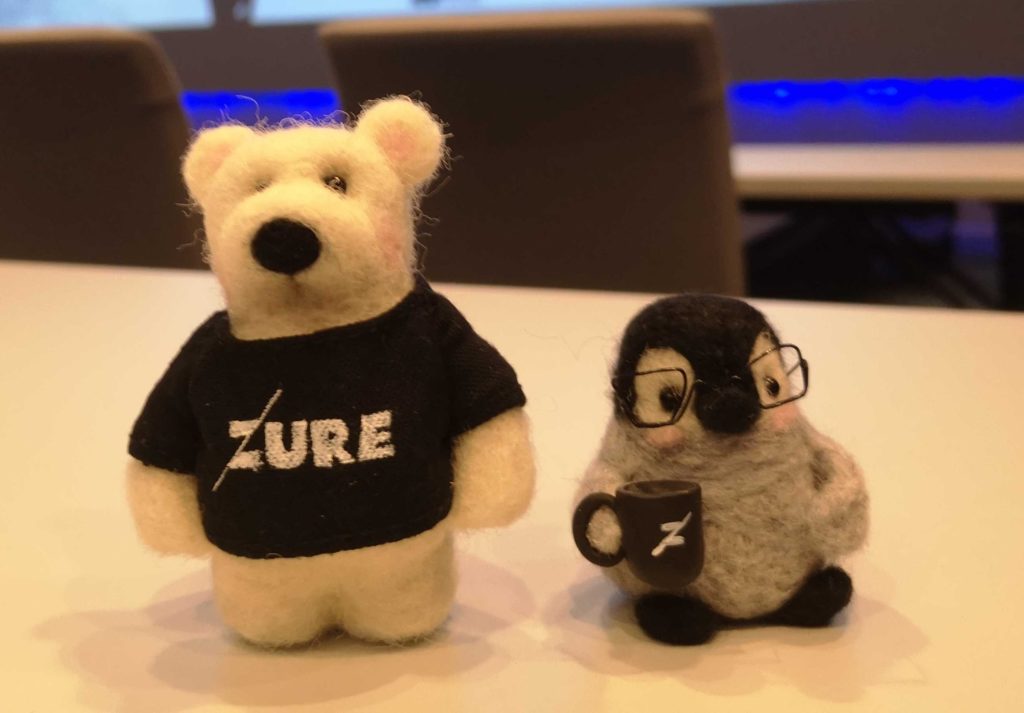
Zure mini-mascots, Karlhu and Minttu.
At the point we surpassed 10 people, in 2014, we took everybody together and figured out our first 'mission' statement. We did replace the term 'mission' with 'purpose', it somehow felt cleaner, not as enterprisey.
It took us about 2 hours, and we came up with
Solve complex issues
with the newest technologies
in transparent manner
And we were happy with it - it totally encapsulated what we wanted to do in a minimalist manner.
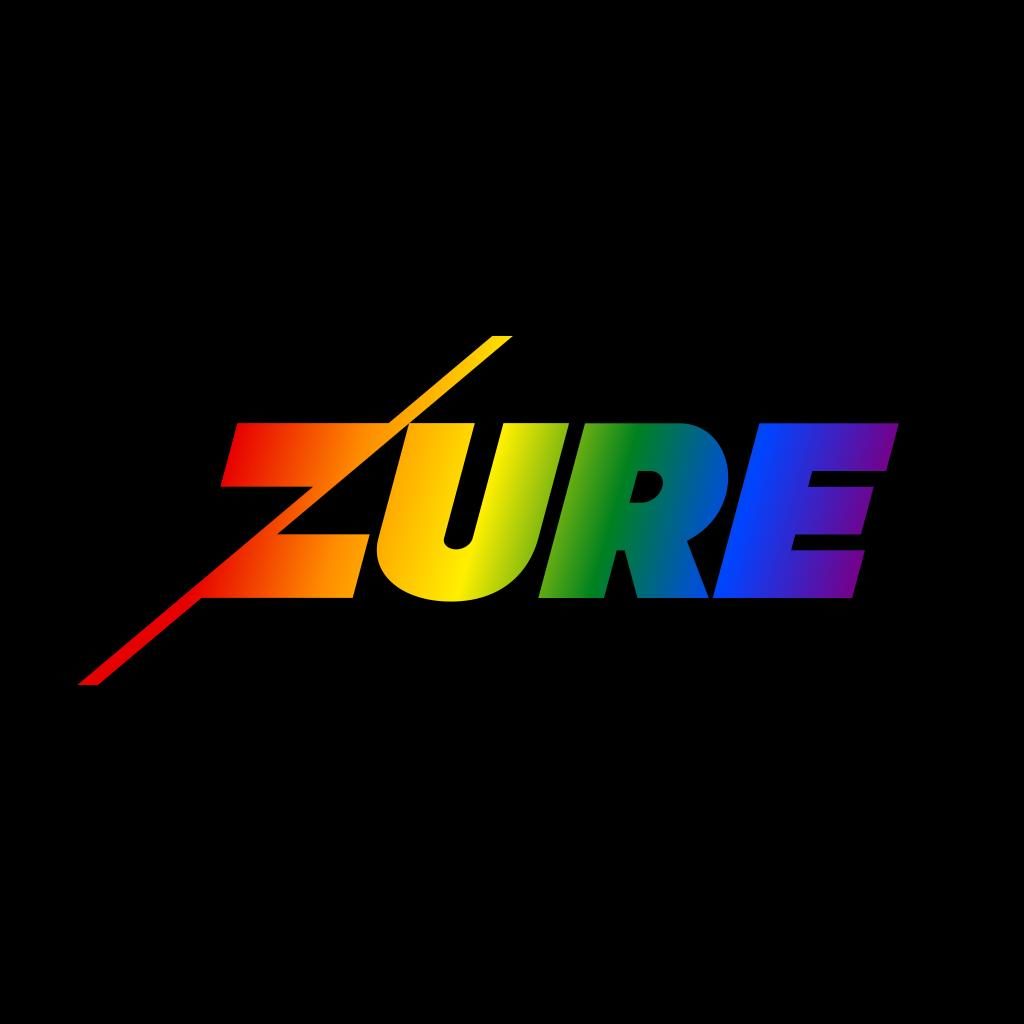
Zure logo during the Pride week
It took a couple of years more to realize that it was boring AF. There was no feeling. It was not inspiring. In professional terms, the text did not reach our limbic systems. Said Ogilvy, "Aim for the company of immortals."
It is kind of amazing, in a kind of unbelieving wonder, that something so good in 2014 felt so empty two years later, even though nothing had really changed. How can something suddenly be so much clearer, after 2 years of active non-thinking? To me, this is one of the personal experiences and examples of the temporal nature of every decision - everything blows over, and therefore it does not make sense to get worked up over mistakes. We all do them. Life is improvement.
In 2016, after 2 years of subconscious pondering on our purpose, the presentation of it evolved to something stronger, to something alive:

Zure purpose, as of 2016
Comparing the old with the new, they are both about challenges, about solving demanding, world-class problems. The call for new technology is implicit in the current purpose. Both purposes hold dear the theme of continuous improving, of growing stronger. Growing badder refers to a situation where we can choose the challenges we're interested in, and the clients with whom we want to work with. Old purpose's call for 'transparent manner' has been replaced with the feeling of community, of trust, of psychological safety.
Our previous office (new office video pending)
Our purpose sticks, but we have not (yet) been as successful at integrating our 'values'. If even the CEO is struggling to remember the all-important 'values', there's something wrong. Therefore in 2019 we changed our three values from hard-to-remember words (like 'Courage') to sentences:
- We face challenges without fear
- Failure is an opportunity to learn
- Work is better together
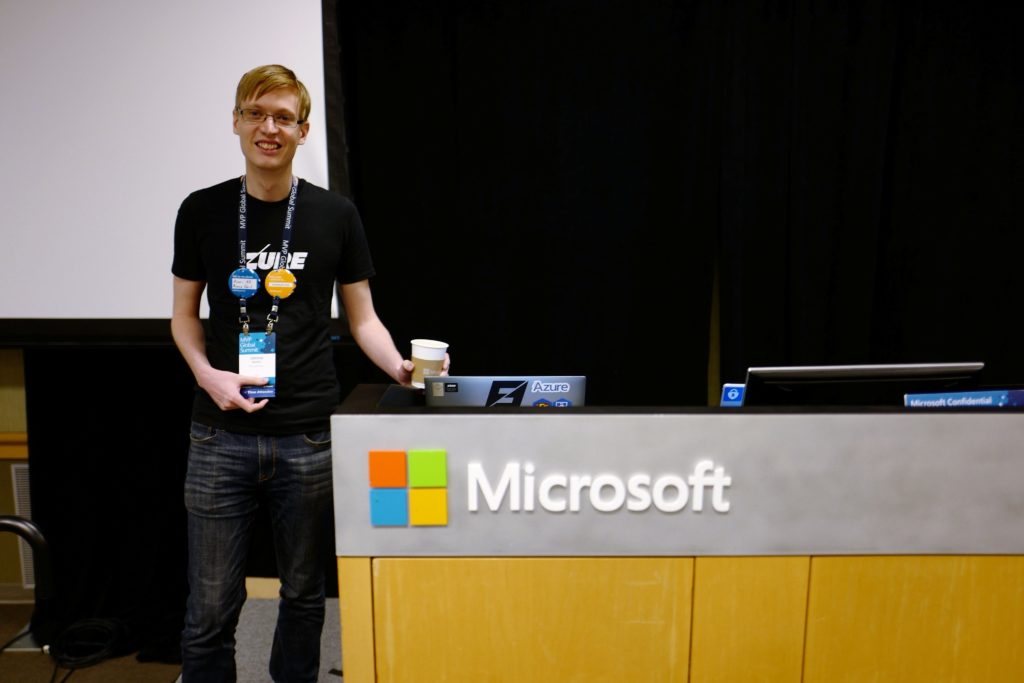
Joonas giving a presentation at a yearly, secretive MVP Summit, where traditionally only Microsoft personnel speak
In August 2018, we wrote a Zure handbook. It is, for now, an internal book about our culture; why do we exist, what are our guidelines, what we do, how do we make decisions as a collective, what metrics do we follow (only two), and so forth. We're in the process of making a public version.
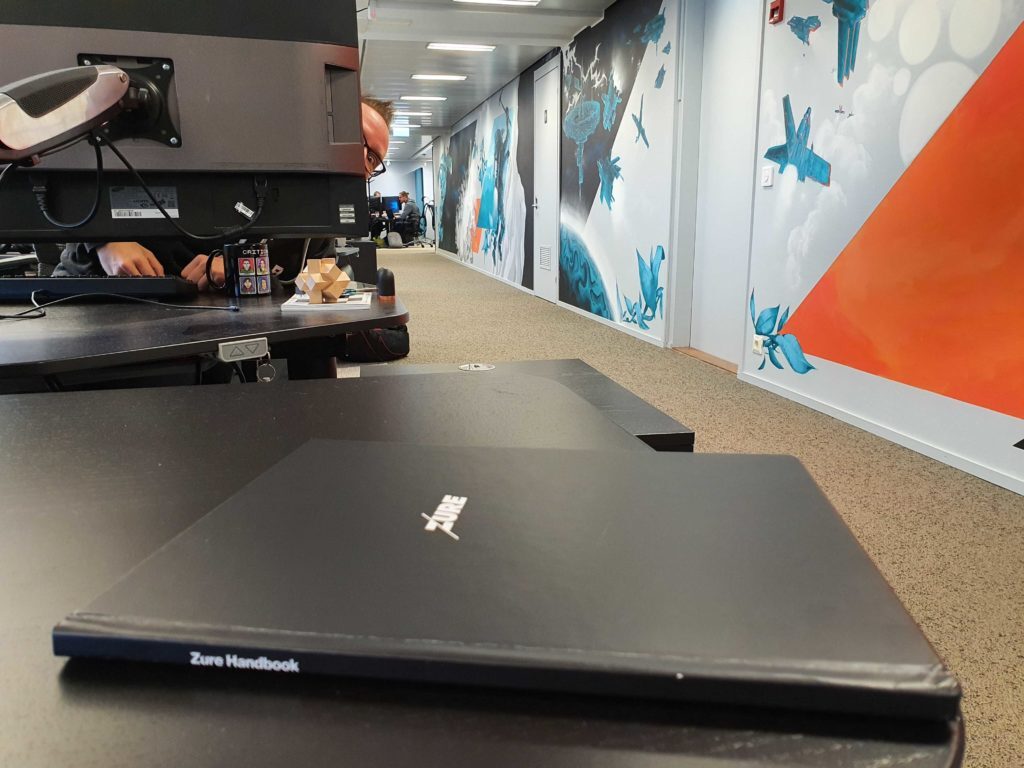
Zure physical handbook (and Jums' being all amazeballs about the aesthetic eye of both CEO and CTO - time well spent, since our creative guy Joona had a remote day)
We want our narrative to be crystal clear. We want all of our actions to stem from our purpose, and from the derived values and principles. It is too easy to drive the daily routine on auto-pilot, and therein lies the danger of acting against the purpose. The largest risk stems from contrary actions to the collective purpose for short-term gain. Therefore, in my mind, the key to a thriving company is our ability to truthfully and accurately depict and adhere to our purpose.
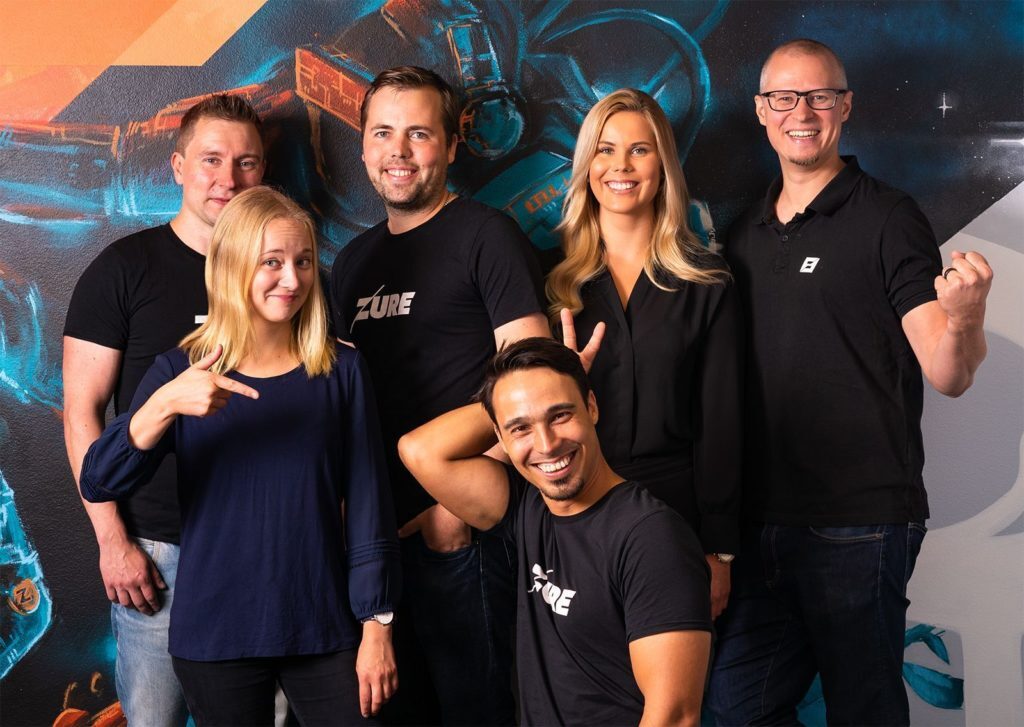
Zure sponsored the 'Ladies Code' event in August 2019 (Mimmit Koodaa), these weirdos being present to offer advice
Not just profit
Even though the law says that the purpose of a company is to make profit for the shareholders, we do not believe that is the whole or even the most meaningful truth anymore.
If you look at articles like this and this, it is becoming apparent that not even traditionally 'money-making machine' corporations believe in the old ways anymore. I'm not saying it has changed because of human goodness or altruism, yet it has changed because the traditional way is not the most effective business model anymore.
When a company does good, it doesn't really matter why - as long as humanity advances.
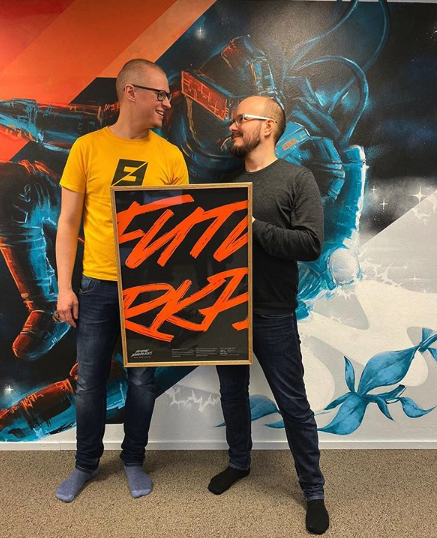
Future workplaces 2020 and a tender gaze
We're a private company. Private companies, by nature, seem more sketchy and suspect than non-profit/community-driven organizations. In theory (and pretty much practice), a private company is ultimately controlled by a small group of people. Depending on your world view, you might either assume these 'executives' are corrupt and self-serving, or that they are just as human as you yourself, with all the hopes and insecurities that entail, but also with goodwill towards a fellow man.
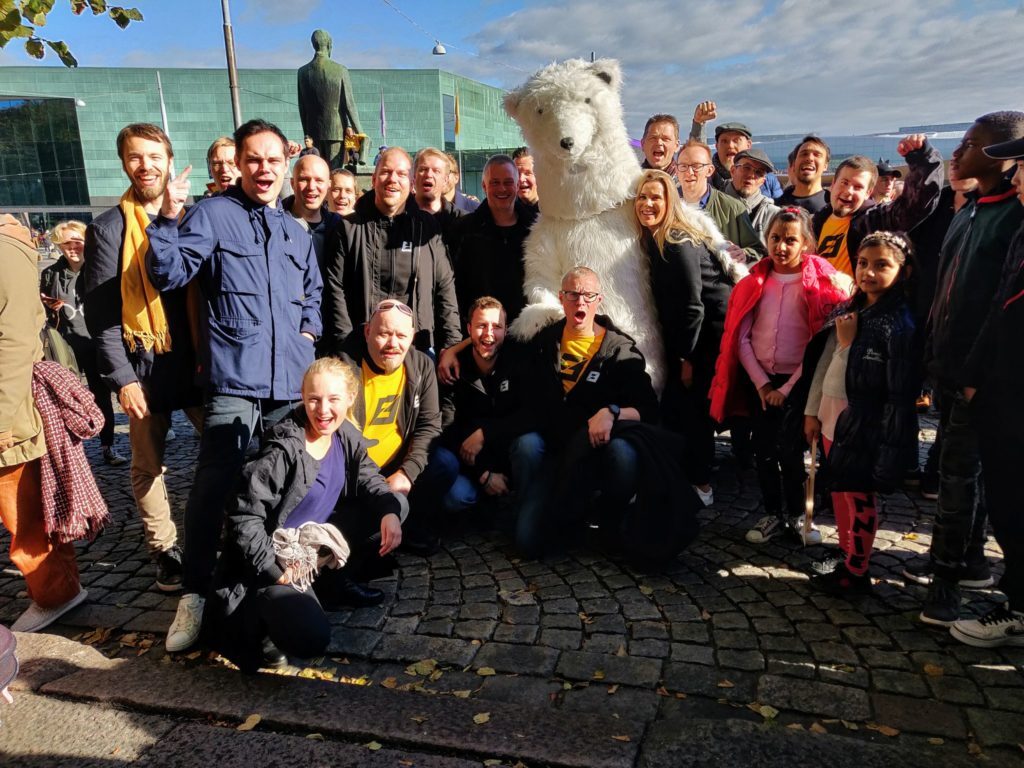
Zure is Carbon Neutral in 2020. This is us at Helsinki Climate Strike on the 27th of September, 2019.
Private companies, like Zure, have a hypothetical option to do a public offering and to become listed in a stock exchange. The only requirement for this is money to execute the required maneuvers. There are no requirements for ethicalness.
And what about Zure, are we thinking of doing an IPO (Initial Public Offering, i.e. getting to stock exchange)?
No, we're not doing an IPO, or planning to do an IPO, or even thinking of setting up a committee to meditate on a road to IPO. On the other hand, we're considering of setting up a committee to actively think of not doing an IPO, just to make sure we don't get listed by accident.
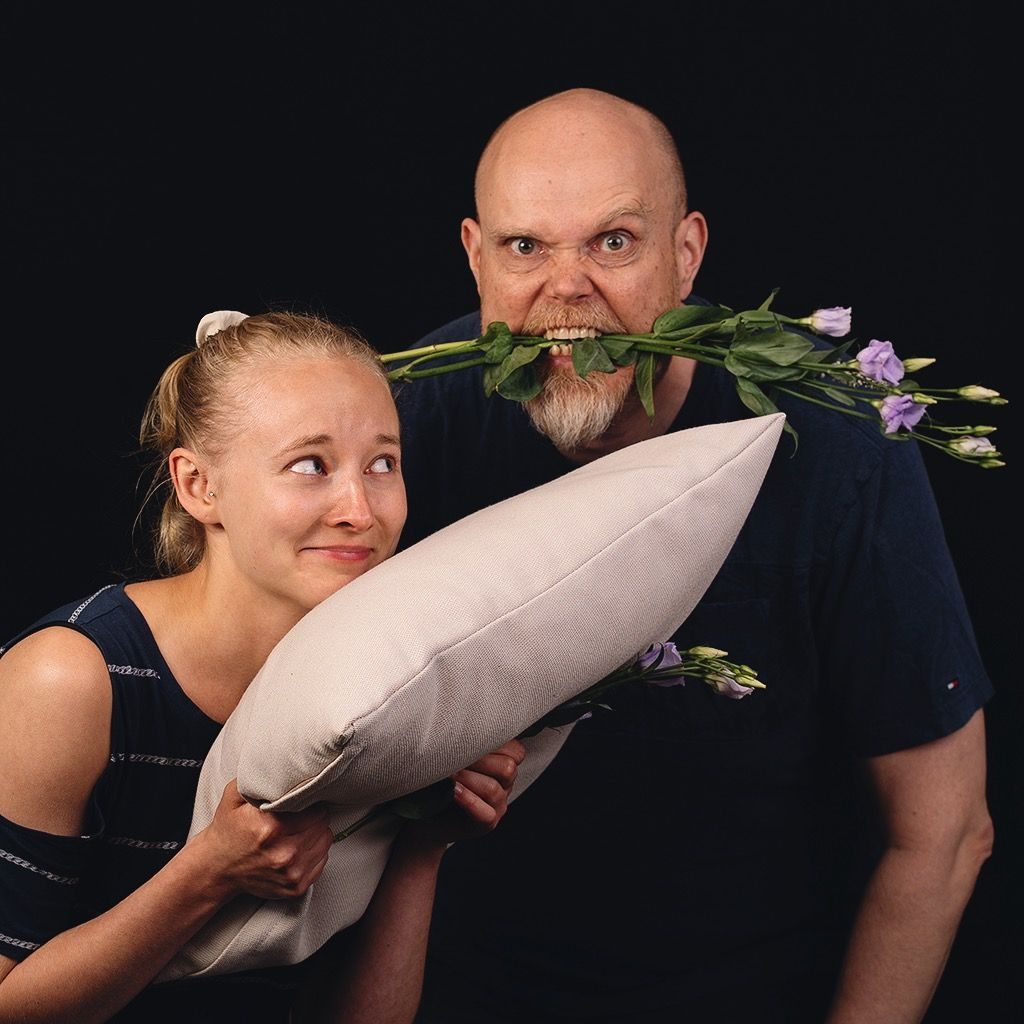
Traditionally creepy Midsummer imagery for traditionally creepy Midsummer magic
We do not believe having more shareholders automatically leads to a better company, although it must be admitted that in some cases the public transparency can affect a company in a positive way.
In general however, we believe the opposite. It is natural for an investor to demand returns, there's nothing bad about that. Therefore, the natural long-term effect of being listed is that the quarterly financial reviews become more important. Quarterly reviews drive the share price, and since it is a clear metric of 'success', it becomes one of the defining metrics inside the company. Profit-driven shareholders will begin to shape the company strategy to optimize share price.
Shareholders as a group are just like any group of people; sometimes short-term gains are valued higher than long-term sustainability.
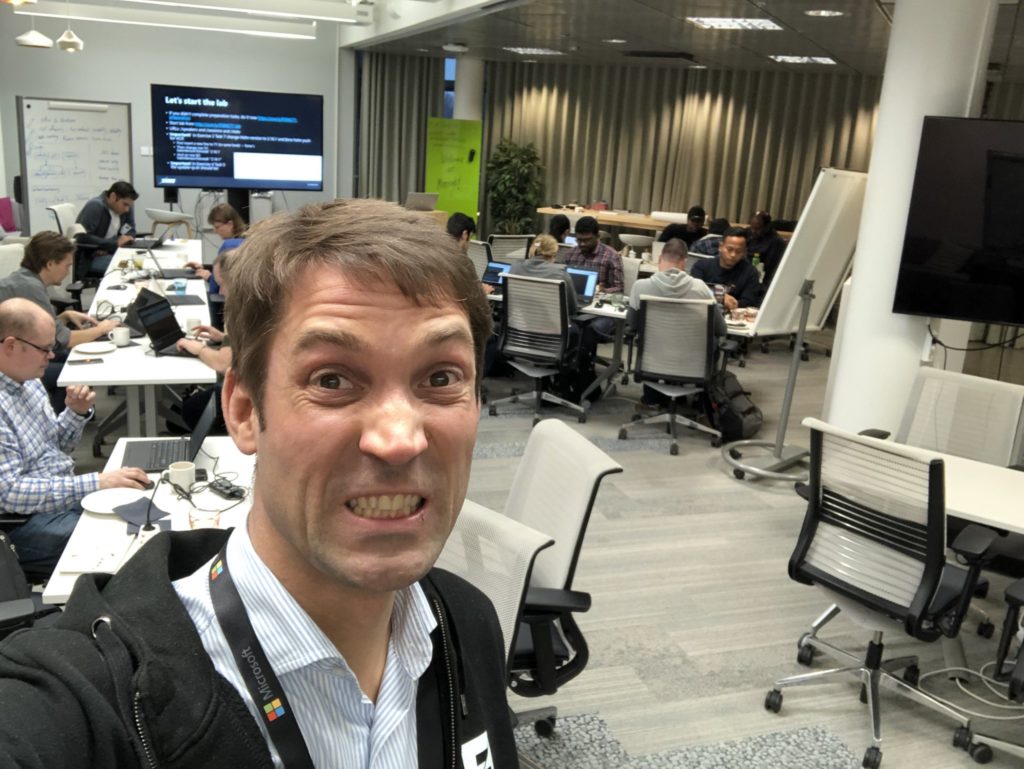
If Kubernetes hurts your head, go serverless
We are averse to defining our measure of success as a quarterly financial metric. We're also averse to letting 'outsiders' have too much power in defining our daily quality of life. We feel that an IPO would bring with itself more risks than opportunities, with the risks possibly being catastrophic in nature.
Zure aims to solve world-class challenges with a world-class crew. Our actions lead to some profit, but instead of a goal, it is a result of us being successful at what we do.
Today
We are quite happy about where we are today. We feel we've been able to continuously improve our ways of working and quality of life. At the same time, our growth has been pretty linear, and all organic.

Zure's Microsoft-related awards and honors: five-time gold partner, 4 Azure MVPs and a finalist on global Partner of the Year
The growth is easy to measure. During the last 8,5 years, our turnover has grown on average 88% and our headcount 77% year-over-year. In 2019, our turnover grew by 25% and headcount by 28%. Our profit grew by 130%.
Our profit in 2019 grew as much as it did because 2018 was a year of investment. We invested in the brand (from Kompozure to Zure, wherein just the zure.com domain itself cost 25 000 €, and that was after 3 years of haggling). We also invested in our continuous services, by transferring experts from project services to continuous services, with a predictable drop in yearly earnings. And lastly we invested in our data services unit, by acquiring experts on data science and data engineering, after which we spend the year 2018 and parts of 2019 in ramping up our data business.
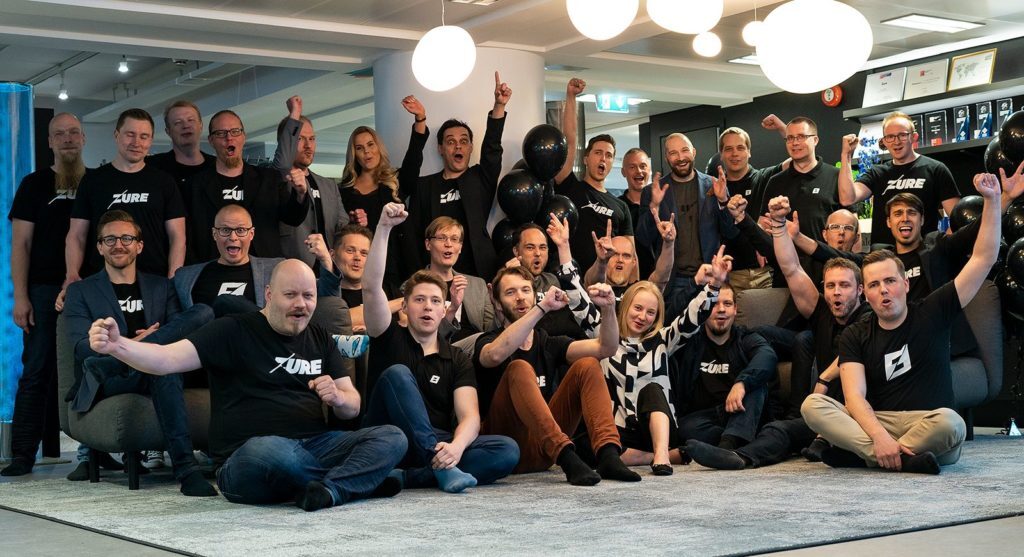
We're honored for being a Microsoft's 2019 Partner of the Year Finalist on the global Application Innovation category
Improvement is harder to measure. We do it with three metrics:
- Personnel satisfaction
- Customer satisfaction
- Tracking concrete improvements in all hands on deck monthly meetings
We've followed personnel and customer satisfaction for 4 years. Personnel satisfaction is measured twice a year with an anonymous survey, while customers are asked monthly. Employee NPS is at 92 currently, and our own measurement for personnel satisfaction is 80,6/100 (all time high, tracked since December 2015). Customer satisfaction in January 2020 was 4,49/5.
We examine and evaluate our habits monthly with the whole company, and we've been doing it since 2013, over 70 times. This is done in a retrospective meeting, a tool from agile project management, in such a way that we're left with a list of assignable improvements. We've implemented hundreds of ideas and fixed gripes during the years. Fast calculation comes to 5 600 hours spent in this monthly meeting, and we wouldn't have it otherwise.
We believe that if your organization starts to do these three things in an honest, transparent, and community-approved manner, the other metrics do not matter. You can only succeed.
Nobody has left Zure since summer 2018, and the two previous experts who left - the other went to Google in Switzerland and the other set up his own gaming company with his brother.
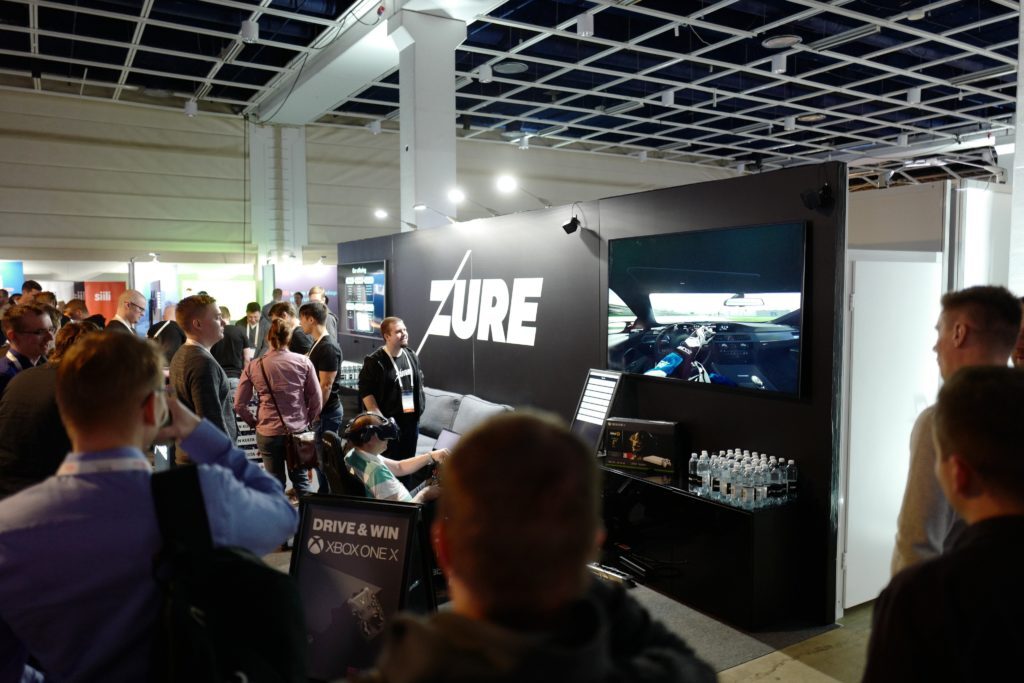
Zure at Techdays Finland 2019, smashing success or at least very much fun
Growth pains are a fact. Growing companies need to be able to react to changes and new requirements constantly. Linear growth has helped us maintain a certain quality of life. Sure, there have been bumps on the road, latest being some issues with our advisory business unit growing 100% in 3 months, requiring changes in how the unit conducted transparency and autonomy internally. It took a few months to fix.
Growth pains will not lessen, and that must be understood. Those of us who do not work full-time as experts, at Zure or elsewhere, must thrive in an unclear environment with changing short-term goals, endeavoring to constantly create clarity and quality of life for others in the organization. In this, clear purpose and non-negotiable principles help.
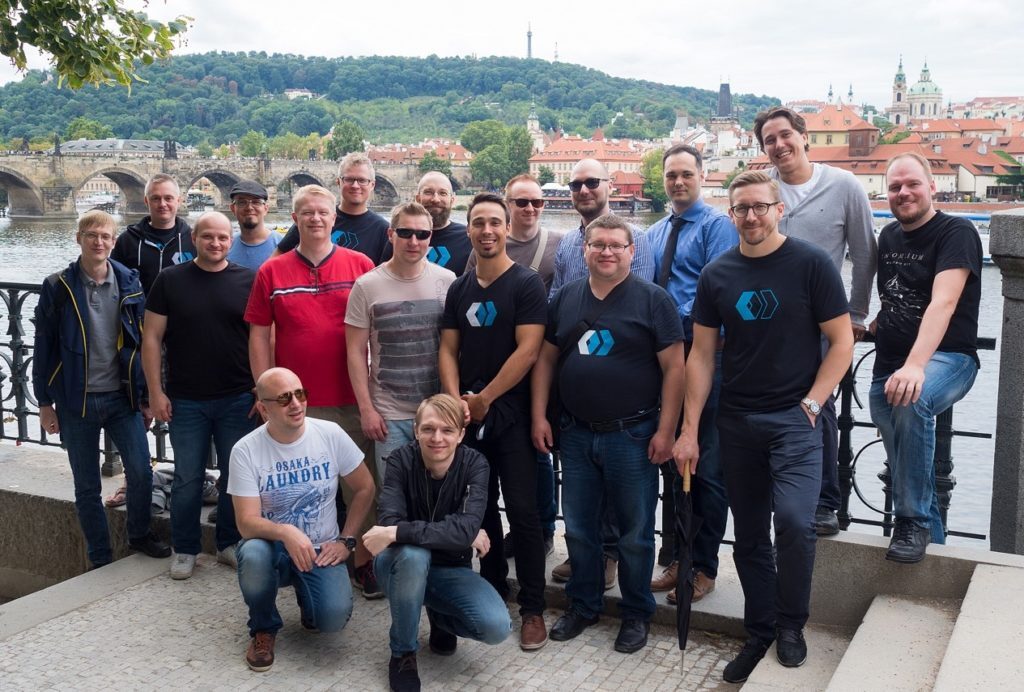
2017, Zure Prague
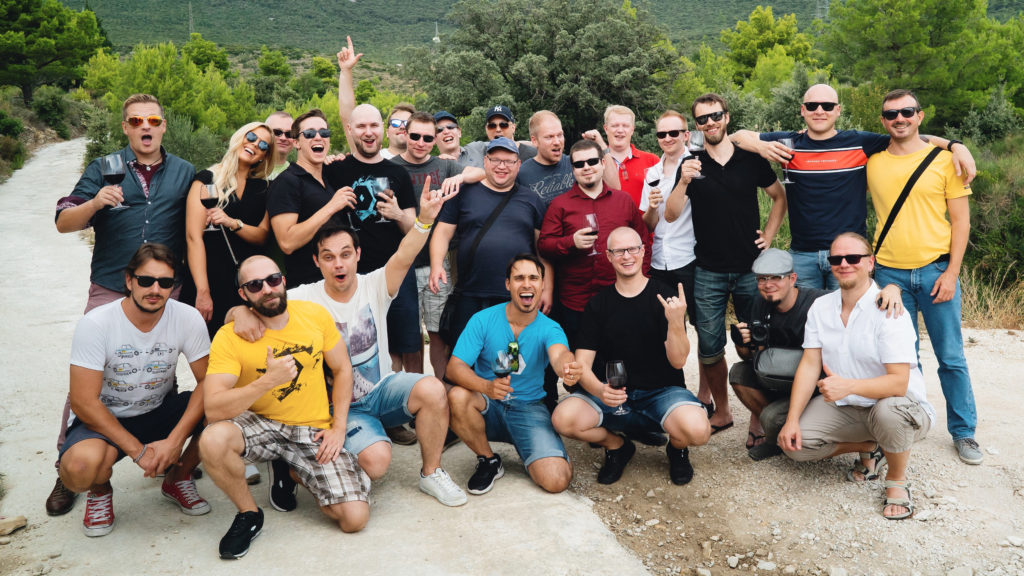
2018, Zure Croatia
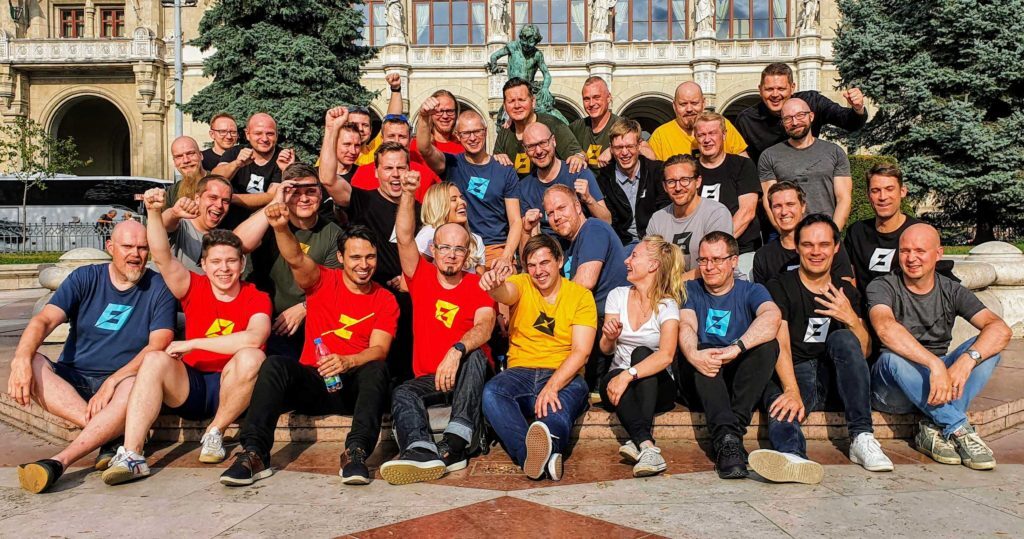
2019, Zure Budapest (In 2020, we'll head to check out Rome. Wheee Italy.)
I'm proud of our guilds. We have 6 technical guilds; architecture, frontend, backend, data, Azure, and DevOps. These guilds are not just for hobbyists, instead they brainstorm, define and train us on the Zure default approaches on how to solve issues. Naturally the project team has the last say on how they solve customer problems, but the guilds provide default guidelines and frameworks. I'm happy of the communal endeavour to improve the delivery.
I counted 15 days of learning per person last year. That includes all kinds of trainings, where our crew's all time favorite seems to be the personal conference fund of 3 days and 800 euros. Everyone has this fund for attending conferences in places like Prague, Paris or the States, with the goal of bringing home new knowledge.
Community-wise the last couple of years have been rewarding, even if Zure is not the primary actor there. Finland Azure User Group, founded by us, surpassed 1500 members, with over 10 events yearly. Azure-related videos published by FAUG have been watched over 150 000 minutes, or 2200 hours, during the past 12 months. Ikkunastudio, a Microsoft themed podcast by Jouni Heikniemi and myself is doing okay too - we're enjoying over 2000 listens a month, with over 80 000 listens in total.
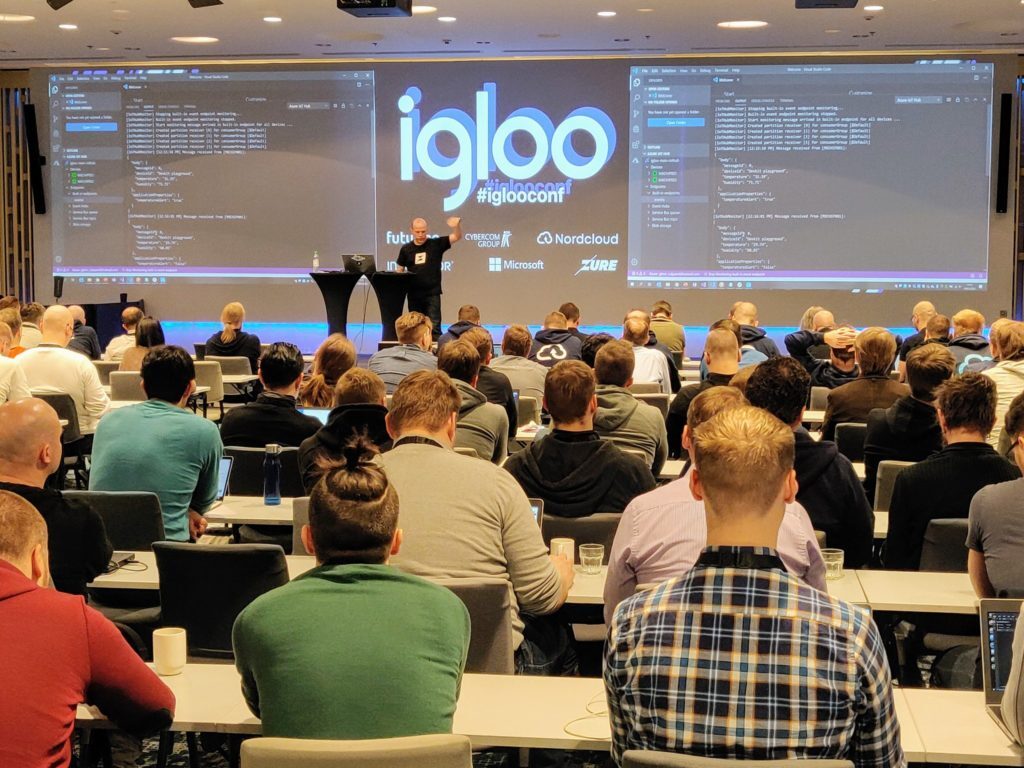
Iglooconf is the biggest event by Finland Azure User Group, herein Glenn (Azure MVP & Zure Belgium co-founder) is giving insight into using Azure for IoT solutions
Figures of the first decade
Zure's the buoy in the ocean that's Azure, and that ocean keeps rising. Azure grew by 62% during the last quarter of 2019 - that's a number.
You want numbers? Of course you want numbers! Here are the numbers for the first 8,5 years of Zure operations.
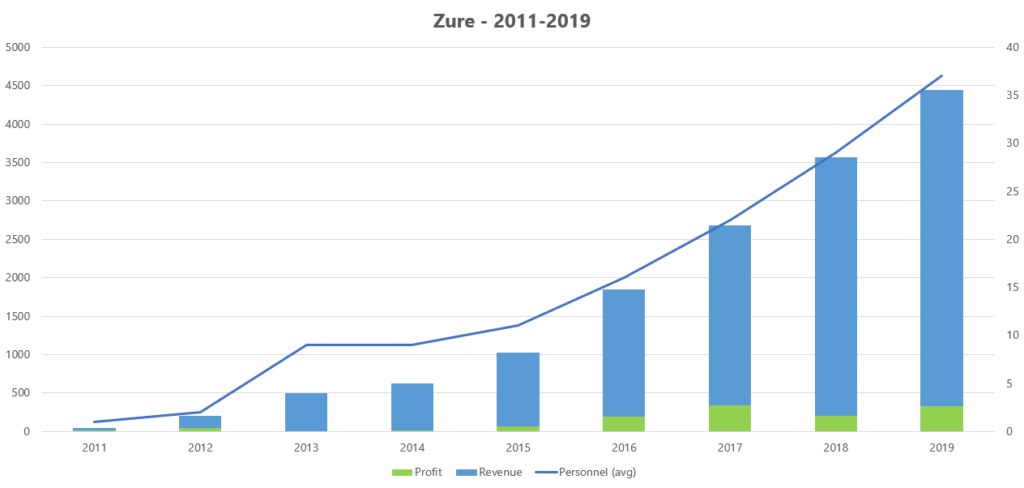
Zure growth 2011-2019
| 2011 | 2012 | 2013 | 2014 | 2015 | 2016 | 2017 | 2018 | 2019 | |
|---|---|---|---|---|---|---|---|---|---|
| Turnover (1000€) | 42 | 202 | 497 | 624 | 1025 | 1844 | 2684 | 3566 | 4450 |
| Turnover growth % | - | 281 % | 146 % | 26 % | 64 % | 80 % | 46 % | 33 % | 25 % |
| Profit (1000€) | 17 | 40 | 1 | 12 | 66 | 194 | 336 | 205 | 300 |
| Profit % | 55 % | 27 % | 0 % | 3 % | 8 % | 13 % | 16 % | 6 % | 7 % |
| Personnel (avg) | 1 | 2 | 9 | 9 | 11 | 16 | 22 | 29 | 37 |
| Turnover per person (1000€) | 42 | 101 | 55 | 69 | 93 | 115 | 122 | 123 | 120 |
| Personnel growth | 100 % | 350 % | 0 % | 22 % | 45 % | 38 % | 32 % | 28 % |
In January 2019 we were 31 people. In January 2020 we are 52 people, including 2 in Belgium.
The next decade
What are we looking to be?
It is quite simple. We want to solve world-class problems. We want to stay at the leading edge of technology advancement. We want to improve ourselves continuously. We want to have pride in what we've built, and who we've helped.
Long-term, we want to be the highest quality cloud company globally.
Cloud company, that we already are. The highest quality? Hard to measure, but we assume not yet. At the same time, I believe we're well on our way there. And global? Well, Belgium is a start.
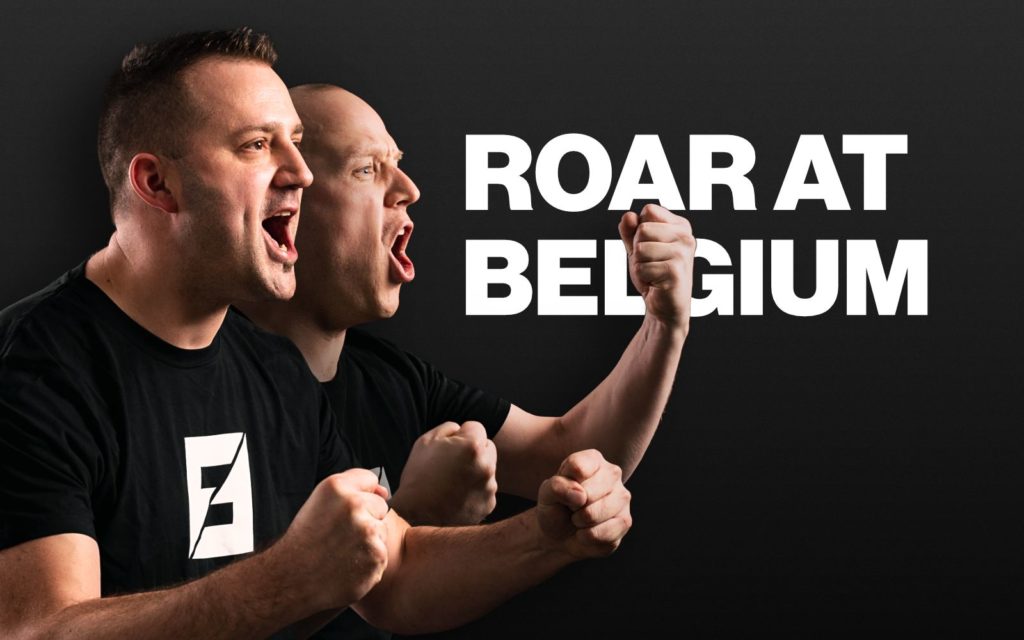
Zure - Roar at Belgium, with Pieter Vandenheede and Glenn Colpaert
Internationalization, to us, is about the team. Sure, local market fit is important, some might argue it is key, but to us, the team is the key. Our goal is to set up instances of Zure ('a zure', pun intended) with like-minded people. People we want to know and work with.
These Zure instances in other countries will be self-sufficient. We're not reaching for business synergies by focusing our 'excellence centers' in Eastern Europe or India or wherever - we feel the goal of becoming the highest quality provider of demanding cloud solutions requires local know-how, personal service, and cultural understanding. Therefore, our offices will all be full nodes in our global graph, with equal edges.
Will we reach our goal before the end of next decade, in 10 years? Probably not, but it doesn't matter.
We got time.
Thank you for reading Zure 2020.
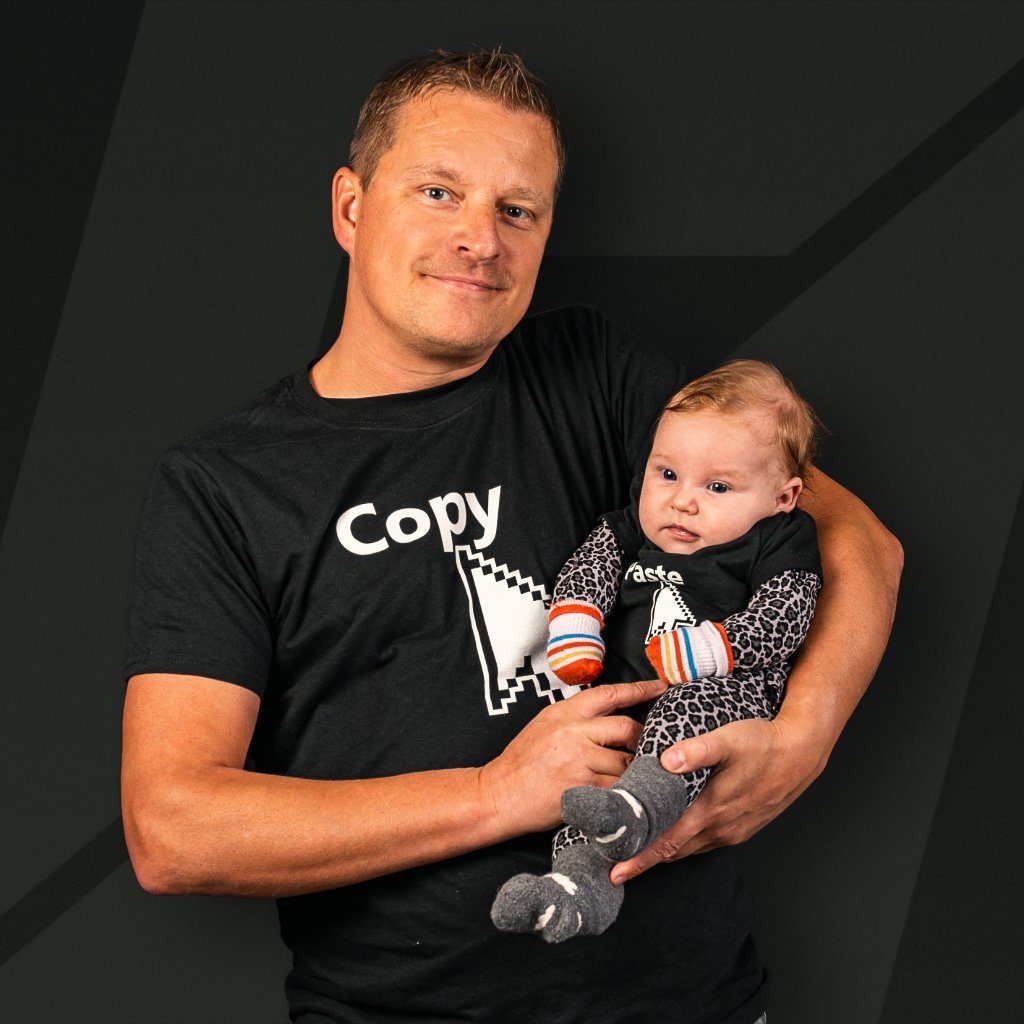
Copy & Paste, the sweetest thing.
Other related posts
- Kompozure’s Mojo
- Startup and Success
- Kompozure 2013: Analysis and figures
- Kompozure 2014: Goals
- Kompozure 2014: Analysis and figures
- Kompozure 2015: Goals
- Kompozure 2015: Analysis and figures
- Kompozure 2016: Goals
- Kompozure 2016: Analysis and figures
- Kompozure 2017: Goals
- Kompozure 2017: Analysis and figures
- CEO ponders on the employee image
- Kompozure 2018: Objectives (Why the change from 'Goals' to 'Objectives'? #facepalm)
- Kompozure is now Zure
- Zure 2020 - part 1
- Zure 2020 #2 - part 2





